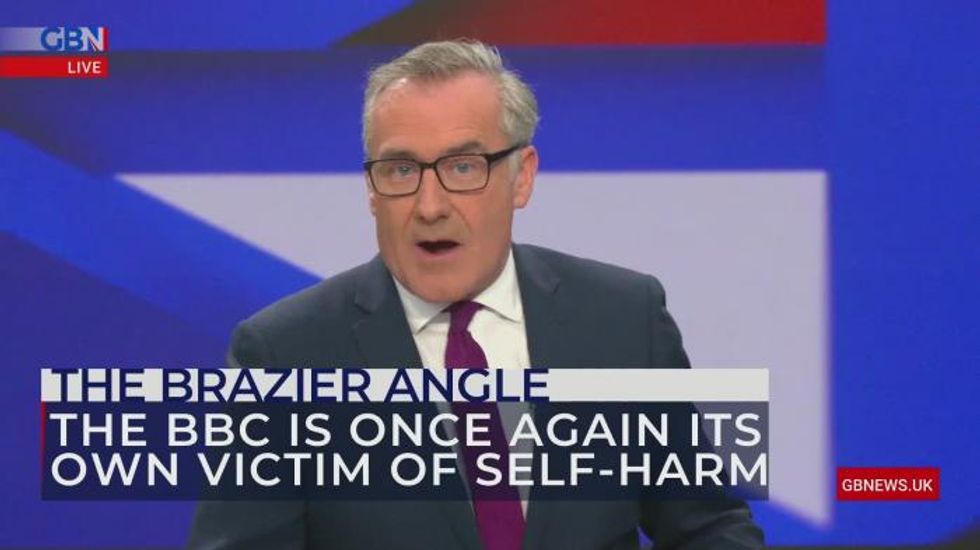Don't Miss
Most Read
Trending on GB News
Tonight the BBC will commit an act of institutional self-harm.
It will run a programme, the first of two, about how the royal brothers, William and Harry fell out and briefed the media against each other.
I have absolutely no idea whether the allegations contained within the programmes are true, I suspect they are. I also think it’s an interesting topic and worthy of journalistic scrutiny. The show is fronted by a presenter I admire, 38-year-old Amal Rajan. A former newspaper editor who, unlike many BBC employees, is neither posh nor predictable.
When the conservative philosopher and Brexiteer Roger Scruton died last year, Amol Rajan posted a warm eulogy. Not many folk at the BBC would do that. It’s an organisation characterised by cognitive uniformity and groupthink. You can guess what most BBC staff think without going to the trouble of asking them.
But in one regard, at least, Amol Rajan is philosophically aligned with his BBC colleagues. I have a strong suspicion that most of those working for the corporation would like to see the abolition of the royal family. As a former royal correspondent, I know for a fact that at least one erstwhile BBC royal watcher is a republican…. but the point is they kept that to themselves.
Amol Rajan, by contrast, has made no secret of his Republicanism. When he was at the Independent he wrote:
“I’m a republican because I’m a patriot. I love my country and want it to be a place where any boy or girl could grow up to be our head of state, not one where Charles Windsor is appointed by birthright.”
Asked about whether this disqualified Amol Rajan from fronting a two-part documentary containing serious allegations which have reportedly left the Queen upset, the BBC responded:
“This article predates Amol’s work at the BBC. Once journalists join the BBC, they leave past views at the door.”
Well, that’s a noble sentiment. But it won’t wash. The appearance is what matters. I have no doubt Amol Rajan will present his show tonight responsibly. Had he not outed himself as a republican, he’d be the right man for the job. He was a former media editor at the BBC, who has a deep understanding of what makes the industry tick.
But this isn’t about his qualifications or his acumen; it’s about his suitability to host a programme that will do the monarchy lasting harm. To which some might say: so what if we know where’s his sympathies lie? After all, surveys show about a fifth of us want our current sovereign to be the last one we have. Republicanism is not an extremist position.
But it is a minority view. The vast bulk of Britons, myself included, disagree with Amol Rajan. We’re patriots like him. Like him, we’re meritocrats. We like the idea that any boy or girl can grow up to be the leader of our nation. They can become Prime Minister. But to be monarch is to preserve a golden thread of history. I don’t think most of us see our hereditary sovereign as the apex of a social pyramid. Rather, they are the ultimate public servant.
When I see the Queen, or a future King Charles III, I see the embodiment of a national history. I see someone prepared to give up their privacy for a life of duty and service. Britain is full of fantastically rich people, quite a few richer than the Queen, most of whom don’t give a toss about the rest of us.
The crown makes the state into something flesh and blood. The royals are imperfect, just like the rest of us. And the squabbles between its members are part of that story.
But Amol Rajan, openly republican, is not the man to tell that story. Not while the BBC treats us, not as equal citizens, but – effectively - as subjects. In a free society we should be able to register our disapproval of the BBC’s actions by taking our custom elsewhere. Under the license fee, we can’t. On pain of prosecution.
Everyone who works for the BBC enjoys a sort of inherited privilege. They don’t have to go out into the marketplace and compete for customers, like we have to. Ultimately, their livelihoods are guaranteed by law, just like the royals











